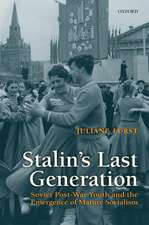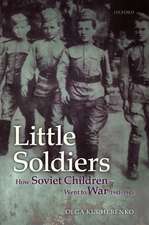The Balkans: Revolution, War, and Political Violence since 1878: Zones of Violence
Autor Mark Biondichen Limba Engleză Hardback – 17 feb 2011
Preț: 865.69 lei
Preț vechi: 1242.59 lei
-30% Nou
Puncte Express: 1299
Preț estimativ în valută:
165.70€ • 180.05$ • 139.28£
165.70€ • 180.05$ • 139.28£
Carte tipărită la comandă
Livrare economică 09-15 aprilie
Preluare comenzi: 021 569.72.76
Specificații
ISBN-13: 9780199299058
ISBN-10: 0199299056
Pagini: 402
Dimensiuni: 166 x 238 x 30 mm
Greutate: 0.76 kg
Editura: OUP OXFORD
Colecția OUP Oxford
Seria Zones of Violence
Locul publicării:Oxford, United Kingdom
ISBN-10: 0199299056
Pagini: 402
Dimensiuni: 166 x 238 x 30 mm
Greutate: 0.76 kg
Editura: OUP OXFORD
Colecția OUP Oxford
Seria Zones of Violence
Locul publicării:Oxford, United Kingdom
Recenzii
Because of its contemporary bibliography and strong synthesis, this is an extremely useful work for understanding modern Balkan conflict and for projecting the future of the region.
the strengths of this book are considerable ... Biondich has produced a thought-provoking synthetic treatment of modern Balkan history that deserves a wide readership among all scholars and policy analysts with interests in better understanding of the region.
Biondich gives a comprehensive overview of the implications of nationalism on the wider political development of the Balkans and of the relevance of multiple actors, ranging from the international influence of the Great Powers to the domestic role of the churches ... The book challenges conventional understandings of the political violence in the Balkans (e.g., Kaplan 1994), while providing a rich overview of the European political transformations over two centuries and their implications for the Balkans ... Biondich's book contributes to the deconstruction of widely held beliefs.
This is a useful monograph. It deals essentially with the development of modern nationalism in a remoter part of Europe. Based on extensive knowledge, it offers students a sound interpretation and the possibility of wider reading on a part of our continent that is becoming less remote by the day.
Biondich has produced a meticulously researched work that integrates a large corpus of literature on the Balkan region with the cutting edge of scholarship on violence, nationalism, and war ... This is a stimulating topic, which has been treated in a stimulating way in Biondichs excellent book.
The Balkans is a most welcome addition to existing literature on state formation, nationalism, and violence in the Balkans. The breath of the study is impressive ... The book should, as such, not only appeal to professional students of the Balkans and to students of political violence, it should also appeal to those in the wider public who have an interest in understanding how and why the Balkans are simply one of Europe's many "zones of violence".
[The book is] surprisingly concise, but at the same time quite eloquent and readable.
Mark Biondich's book represents a fresh elaboration on the presence of nationalism in the Balkans and its relevance for the post-1878 political developments.
the strengths of this book are considerable ... Biondich has produced a thought-provoking synthetic treatment of modern Balkan history that deserves a wide readership among all scholars and policy analysts with interests in better understanding of the region.
Biondich gives a comprehensive overview of the implications of nationalism on the wider political development of the Balkans and of the relevance of multiple actors, ranging from the international influence of the Great Powers to the domestic role of the churches ... The book challenges conventional understandings of the political violence in the Balkans (e.g., Kaplan 1994), while providing a rich overview of the European political transformations over two centuries and their implications for the Balkans ... Biondich's book contributes to the deconstruction of widely held beliefs.
This is a useful monograph. It deals essentially with the development of modern nationalism in a remoter part of Europe. Based on extensive knowledge, it offers students a sound interpretation and the possibility of wider reading on a part of our continent that is becoming less remote by the day.
Biondich has produced a meticulously researched work that integrates a large corpus of literature on the Balkan region with the cutting edge of scholarship on violence, nationalism, and war ... This is a stimulating topic, which has been treated in a stimulating way in Biondichs excellent book.
The Balkans is a most welcome addition to existing literature on state formation, nationalism, and violence in the Balkans. The breath of the study is impressive ... The book should, as such, not only appeal to professional students of the Balkans and to students of political violence, it should also appeal to those in the wider public who have an interest in understanding how and why the Balkans are simply one of Europe's many "zones of violence".
[The book is] surprisingly concise, but at the same time quite eloquent and readable.
Mark Biondich's book represents a fresh elaboration on the presence of nationalism in the Balkans and its relevance for the post-1878 political developments.
Notă biografică
Mark Biondich is an Adjunct Research Professor at the Institute of European, Russian and Eurasian Studies at Carleton University in Ottawa, Canada, where he teaches on the Balkans and nationalism and ethnic conflict. The author of Stjepan Radic, the Croat Peasant Party and the Politics of Mass Mobilization, 1904-1928 (2000), he is currently completing a history of Croatian fascism.























